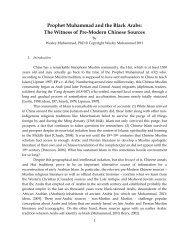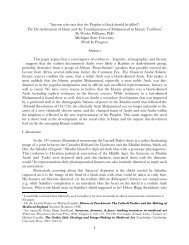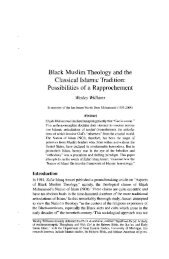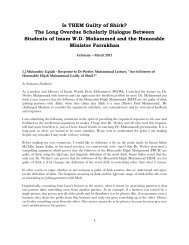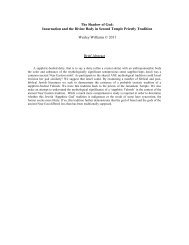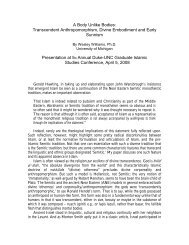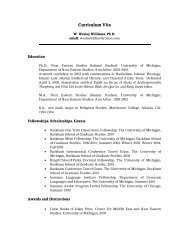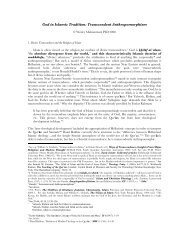THEM_on_Prophet_Muha.. - Dr. Wesley Muhammad
THEM_on_Prophet_Muha.. - Dr. Wesley Muhammad
THEM_on_Prophet_Muha.. - Dr. Wesley Muhammad
You also want an ePaper? Increase the reach of your titles
YUMPU automatically turns print PDFs into web optimized ePapers that Google loves.
Writing in the Pittsburgh Courier <str<strong>on</strong>g>THEM</str<strong>on</strong>g> said:<br />
<strong>Muha</strong>mmad found the st<strong>on</strong>e out of place and had it put back<br />
into its proper place. This act of <strong>Muha</strong>mmad shows that he was<br />
not the fulfiller of the sign which the st<strong>on</strong>e represents, but rather a<br />
prototype of that which the st<strong>on</strong>e represents. 42<br />
A prototype is “an original model <strong>on</strong> which something is<br />
patterned; archetype; an individual that exhibits the essential<br />
features of a later type.” 43 Though not impossible, it is difficult<br />
to imagine a Caucasian (“white man”), no matter how<br />
singularly righteous, being the prototype of the last black<br />
Messenger of the Black God, Allah. The <strong>Prophet</strong> of Arabia<br />
is also prototype of the Last Messenger in that both were<br />
sent to their own black communities (black Arabs and black<br />
Americans), in c<strong>on</strong>trast to the prophets prior to <strong>Prophet</strong><br />
<strong>Muha</strong>mmd who were sent to the white race.<br />
If this is the case, why then did <str<strong>on</strong>g>THEM</str<strong>on</strong>g> emphasize the<br />
‘whiteness’ of the <strong>Prophet</strong> as distinct from the ‘blackness’ of<br />
the unhewn ‘st<strong>on</strong>e’ of the last Day? I d<strong>on</strong>’t know. However,<br />
this too is perfectly c<strong>on</strong>sistent with Classical Arabic<br />
Traditi<strong>on</strong>.<br />
Above we quoted the traditi<strong>on</strong> according to which God<br />
gave the Arabs (and the Semites in general) a black<br />
complexi<strong>on</strong> that was luminous and free of blemish, a<br />
complexi<strong>on</strong> called in Arabic ‘white’ (al-udma wa l-bay§∙),<br />
but to Africans he gave <strong>on</strong>ly a black, we might say unhewn<br />
42 “The History of Jesus,” A6.<br />
43 Merriam-Webster’s Collegiate Dicti<strong>on</strong>ary Tenth Editi<strong>on</strong> (Springfield,<br />
Mass.: Merriam-Webster, 2001) s.v.<br />
19



